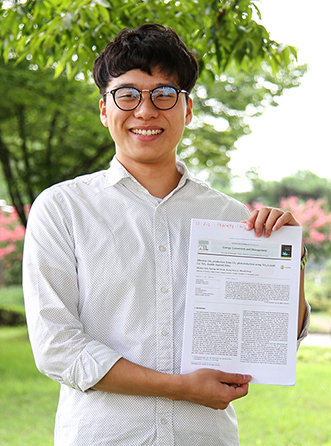School of Chemistry Undergraduate Publishes Study in World’s Most Authoritative SCI Journal N
No.88803- Writer pr
- Date : 2015.09.14 10:15
- Views : 7741
School of Chemistry senior Park Min-gyu develops next-generation energy source ‘methane’ generation catalyst
Achieved low-cost, high efficiency compared to existing catalysts
Clue to solving both environmental and energy issues
[Sep 9, 2015]

An undergraduate student of YU made headlines by publishing his thesis in the world’s most authoritative SCI international academic journal.
Park Min-gyu (23) is a senior currently enrolled in the School of Chemistry. His study was recently published in one of the world’s most acclaimed academic journals in the mechanics sector in the upper 1.46% titled, <Energy Conversion and Management (IF), 4.38)>. Park’s paper, ‘Development of Carbon Dioxide Methane Fuel using Double Layer Membrane of Titania (TiO)/Copper-Titania (Cu-TiO)’. It has already been released online and it is scheduled to be published in the journal that will be issued on October 1.
Park’s thesis was a study on the production of methane, a main ingredient of natural gases that is receiving attention as a next-generation energy source. Park processed a powder ‘copper-titania’ by adding copper ion that has high conductivity in titania that reacts to light to cause catalyst activation into a dough-form. Then, it was coated with a double layer to use as a carbon dioxide reducing agent. In the past, expensive catalysts such as ruthenium (Ru) or palladium (Pd) in order to create methane by deoxidation of carbon dioxide. However, Park’s study has allowed it to to cut costs drastically and raise efficiency for the process of producing methane using carbon dioxide.
The issue of exhaustion of energy due to the continued use of fossil fuels and the global warming issue resulting from the increase of carbon dioxide have recently become global issues. Therefore, this research, which achieved cheaper costs and higher efficiency for generating methane through the deoxidation of carbon dioxide is receiving high levels of attention as it provided a first step to simultaneously solve both environmental and energy issues.
YU Professor of Chemistry and Biochemistry Kang Mi-sook (46), who participated in this study as a correspondence author, said, “This study provided a technical basis to convert carbon dioxide, which is the main cause of global warming, into the useful fuel of methane using photochemistry methods.” She added, “It will contribute in the development of an eco-friendly natural circulation system that will be able to solve the energy depletion and environment restoration issues that the world will is now facing.”
In fact, the YU School of Chemistry and Biochemistry Mineral Materials Chemical Research Lab (Advisor Kang Mi-sook) is already well known for its research capacities. Last year, undergraduate students published five papers in SCI level journals. Also undergraduate and graduates received a total of 12 awards in various academic conferences held both in Korea and abroad such as the 2013 ‘Nano Korea 2013’ excellent presentation award and the ‘ISGMA 2013’ excellent presentation award. Furthermore, students won the ‘Graduate School Catalyst Research Award’, which is given to graduate students with exceptional research achievements annually by the Korean Institute of Chemical Engineers, for three consecutive years.
Park Min-gyu, who said that he is highly interested in developing materials useful to humans while focusing mainly on research in catalysts, stated, “I am still in my infancy in terms of research capacities as I am an undergraduate. I was lucky with this research because I just followed the instructions of my professor.” He added, “After I graduate, I want to enroll in graduate school and study and research the catalyst field more in depth.”